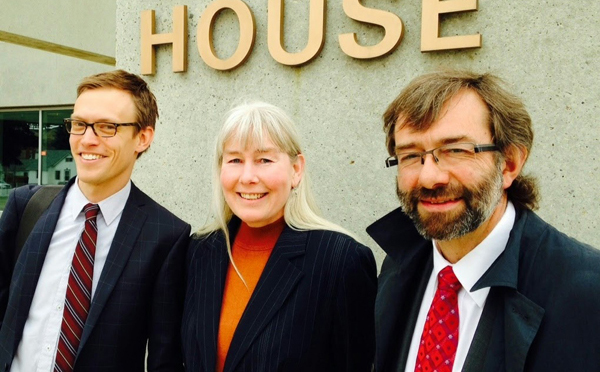Jessica Ernst, the businesswoman and oil patch scientist defiantly challenging the regulation of hydraulic fracturing in Alberta, has scored another legal victory.
The Alberta government will not appeal a recent ruling that allows Ernst to sue Alberta Environment for the alleged negligent investigation of water well contamination during the shallow fracking of coal seams in central Alberta.
The Alberta government, which is highly dependent on hydrocarbon revenue, gave no reason to the Canadian Press for not appealing the decision.
Last month, Alberta Chief Justice Neil Wittmann dismissed all key arguments made by the government of Alberta against the lawsuit of Ernst, including the fear that it may unleash a flood of lawsuits against a government that supports hydraulic fracking of energy wells with numerous subsidies.
The Alberta government argued that Ernst's $33-million lawsuit had no merit; that the government owed no duty of care to landowners with contaminated water; and that the government had statutory immunity.
But Wittmann's ruling disagreed on all major counts and ordered the lawsuit against the government to proceed. "While this is a novel claim, I find there is a reasonable prospect Ernst will succeed in establishing that Alberta owed her a prima facie duty of care," Wittmann wrote.
Ernst cautiously welcomed the government's decision. "It cost me a year of time in my lawsuit and lots of money, but it is a major victory," she said.
"There is still a lot of hell ahead. The government maintains that fracking is safe and that all methane contamination of water wells is natural. I think my lawsuit, which is built on corporate and regulatory data, will prove things differently."
Ernst added that she looks forward to the Alberta government's statement of defence "and the disclosure of many more dirty details in document exchange."
To date, Ernst has filed more than 2,000 documents with Encana to support her lawsuit. The gas giant must disclose its documents by Dec. 19.
The suit so far
Ernst's seven-year-old lawsuit alleges that Encana, a pioneer of hydraulic fracturing, drilled and fractured shallow coal bed methane wells directly in her local groundwater supply between 2001 and 2004 near Rosebud, Alberta, polluting Ernst's water well with enough toxic chemicals and methane to make it flammable.
The lawsuit also alleges that two provincial regulators, the Energy Resources Conservation Board (ERCB) and Alberta Environment, failed to act on documented and repeated violations of the law.
Chief Justice Wittman, however, struck the ERCB from the case last year on the grounds it couldn't be sued or charged with breaching Canada's Charter of Rights due to an immunity clause.
Ernst's lawsuit alleges that the ERCB (now the Alberta Energy Regulator) violated her constitutional rights by falsely accusing her of making criminal threats and banishing all contact with her due to her outspoken criticism of the board.
After Alberta's Court of Appeal upheld Wittmann's decision in favor of the ERCB, Ernst told her lawyers to take the case to the Supreme Court.
If the Supreme Court hears the case (only a small percentage are heard), Ernst's lawyers will argue that immunity clauses in provincial legislation cannot protect the state and "block an individual from seeking a remedy for breach" of her fundamental rights and freedoms under the nation's Charter of Rights.
ERCB's response
Glenn Solomon, a prominent Calgary lawyer representing the ERCB, filed a response to Ernst's special filing before the Supreme Court.
"The ERCB submits that there is no legal issue of general importance which requires further guidance from this Court nor any injustice to the Applicant to remedy," says the document.
Last year, Solomon advised a global oil and gas driller seeking legal help for his mother, Ann Craft, that suing energy regulators was akin to "World War Three" and that a citizen would be "crazy" to do so.
In a taped iPhone conversation, Solomon, one of Alberta's top energy litigators, also explained how the multi-billion-dollar fracking industry actively bought the silence of landowners claiming damages with buy-outs and confidentiality agreements.
Fracking still contentious
Hydraulic fracturing, the pressurized injection of fluids, chemicals and sand into shallow and deep rock formations as tight as granite, has sparked concerns about earthquakes, methane leaks, groundwater contamination, land fragmentation and toxic air pollution across the continent.
Although industry lobbyists still contend that fracking poses no risk to groundwater, studies and textbooks by petroleum geologists tell a vastly different story.
The Nontechnical Guide to Petroleum Geology, Exploration, Drilling and Production by Norman J. Hyne, for example, spells out the hazards bluntly: "A well can be fracked several times during its lifetime and in some instance, however, hydraulic fracturing can harm a well by fracking into water. The hydraulically induced fractures extend vertically into a water reservoir that floods the well with water."
The popular book is cited in numerous journals and industry websites.
Ernst said that Hyne's description fits what happened to the aquifer near her home in Rosebud, during a frenzied drilling boom for shallow sands and coal bed methane, an unconventional resource with marginal economic returns.
In Rosebud, Encana repeatedly fracked directly into the aquifer, according to a 2005 report by Hydrogeological Consultants. The report has been disclosed to Encana in what's known as a document exchange. ![]()
Read more: Energy, Rights + Justice, Environment
















Tyee Commenting Guidelines
Comments that violate guidelines risk being deleted, and violations may result in a temporary or permanent user ban. Maintain the spirit of good conversation to stay in the discussion.
*Please note The Tyee is not a forum for spreading misinformation about COVID-19, denying its existence or minimizing its risk to public health.
Do:
Do not: